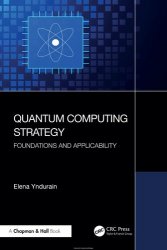Quantum Computing Strategy: Foundations and Applicability
- Добавил: literator
- Дата: 25-01-2025, 18:02
- Комментариев: 0
 Название: Quantum Computing Strategy: Foundations and Applicability
Название: Quantum Computing Strategy: Foundations and ApplicabilityАвтор: Elena Yndurain
Издательство: CRC Press
Год: 2025
Страниц: 237
Язык: английский
Формат: pdf (true), epub
Размер: 28.1 MB
Quantum Computing is not merely an incremental advancement in computing technology; it represents a fundamentally new paradigm, distinct from classical computing. Rooted in quantum mechanics, it introduces an entirely novel information theory. As a result, translating existing models, solution designs, and approaches to quantum computing is a complex, non-trivial task. This comprehensive book demystifies quantum concepts through accessible explanations, practical case studies, and real-world examples from industries such as aerospace, agriculture, automotive, chemicals, energy, finance, government, healthcare, manufacturing, supply chain, and telecommunications.
Blending a business perspective with a scientific rigor, this book is divided into two parts. The first part covers foundational technical concepts, including quantum mechanics principles that enable quantum technologies, key quantum algorithms, mathematical frameworks, quantum computing technologies, post-quantum cryptography, the types of problems quantum computers solve, and the technology’s outlook. The second part focuses on practical applicability, presenting industry use cases, guidance on approaching quantum computing problems, mapping use cases to quantum computing, responsible quantum computing practices, and a roadmap for businesses preparing for quantum adoption. This structured approach equips readers with the knowledge and tools to effectively integrate quantum computing into their strategic planning.
There are two main approaches for programming quantum computers, (1) analog quantum computers and (2) digital quantum computers. The terms “analog” and “digital” refer to two different processing methods. The first one operates by creating a continuous representation of the physical world. The latter represents information using discrete numerical values (often in binary form) and perform calculations using digital logic. Analog computers represent data using physical quantities, they perform operations using continuous functions. They were highly regarded for their capability to simulate and resolve issues in real-time for specific fields, such as aerospace for flight simulations.
Digital computers represent data using binary digits, perform operations using discrete steps. They are more versatile than analog computers, as they can perform any computation, provided it is given enough time and memory resources. This is what is known as universal computer, tied to Alan Turing’s Turing machine concept, a theoretical model to have a machine capable of performing any possible mathematical computation. Quantum computers can also be analog or digital. The main difference is that, the first one is a continuous method and the latter a gate-based sequence of discrete operations.
Quantum Computing Strategy: Foundations and Applicability serves as an essential reference for technology enthusiasts, business leaders, policymakers, and educators seeking to understand the benefits quantum computing offers enterprises. Designed as a self-contained learning resource, it empowers readers to navigate the emerging quantum landscape confidently.
Скачать Quantum Computing Strategy: Foundations and Applicability
[related-news] [/related-news]
Внимание
Уважаемый посетитель, Вы зашли на сайт как незарегистрированный пользователь.
Мы рекомендуем Вам зарегистрироваться либо войти на сайт под своим именем.
Уважаемый посетитель, Вы зашли на сайт как незарегистрированный пользователь.
Мы рекомендуем Вам зарегистрироваться либо войти на сайт под своим именем.
